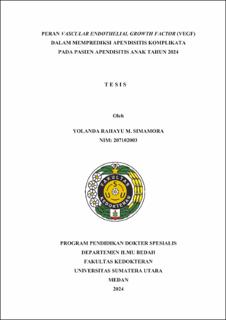Peran Vascular Endothelial Growth Factor (VEGF) dalam Memprediksi Apendisitis Komplikata pada Pasien Apendisitis Anak Tahun 2024
The Role of Vascular Endothelial Growth Factor (VEGF) in Predicting Complicated Appendicitis in Childhood Appendicitis Patient in 2024

Date
2024Author
Simamora, Yolanda Rahayu M
Advisor(s)
Fikri, Erjan
Siregar, Kamal Basri
Metadata
Show full item recordAbstract
Background: Appendicitis is one of the most common pediatric emergency surgeries, with complication risks influenced by various factors, including Vascular Endothelial Growth Factor (VEGF). VEGF plays a crucial role in angiogenesis, affecting wound healing and the development of complications.
Methods: This prospective analytic study analyzed VEGF levels as a predictive factor for complicated appendicitis in 20 pediatric patients. Blood samples were taken and examined serially at intervals of ≤24 hours, 25-48 hours, 49-72 hours, 73-96 hours, and more than 96 hours from symptom onset.
Results: The average VEGF levels were within the normal range (31.25–2000 pg/ml) in 80% of patients. There was no statistically significant difference between VEGF levels and macroscopic findings of appendicitis (p>0.05). However, a trend of decreasing VEGF levels was observed with the increasing duration of symptoms.
Discussion: VEGF plays a role in angiogenesis and mucosal regeneration in appendicitis. Lower VEGF levels indicate an increased risk of complicated appendicitis. These findings align with previous studies showing VEGF reduction is associated with complications.
Conclusion: VEGF levels tend to be lower in complicated appendicitis, though not statistically significant (p>0,05). Further research with a larger sample size is needed to determine the VEGF cutoff for prediction.
Collections
- Master Theses [204]
